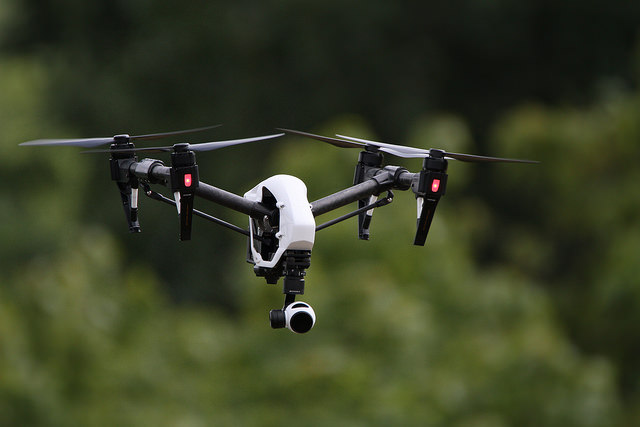Jessica Gang
Opinions Editor
Ever since drone usage has increased in the military, they have been viewed as instruments that push the boundaries of science and technology. In recent years, however, they have also become increasingly popular in the entertainment industry. From being used in aerial photography to taking center stage at Drake concerts, drones are quickly becoming ingrained in our everyday lives.
The U.S. military first began developing and flying unmanned drones in Afghanistan in 2000. Drones were primarily associated with the military until 2006, when the Federal Aviation Administration (FAA) issued the first commercial drone permit. The FAA issued this permit after increased pressure from government agencies and corporations, who sought to acquire drones for disaster relief and farming, as well as for a variety of other uses.
However, high demand for drones has recently developed in a slightly unexpected market—the entertainment industry. In the entertainment industry, the purpose of drones is not to advance science or technology, but instead to enhance performance.
This new use of drones has taken aerial photography and videography to new heights, allowing even amateur photographers to produce photos and videos that would have been unfathomable just a few years ago.
For example, over two million viewers (and counting) have seen aerial photographer Tim Whittaker’s YouTube video of a flock of New Zealand sheep being herded by a few small, dark dots that turn out to be sheepdogs upon further examination. Due to the use of a drone, a seemingly ordinary event was turned into a mesmerizing display of movement and contrast.
Hollywood has also capitalized on the drone craze. The opening motorcycle sequence of the recent James Bond film “Skyfall” was filmed by a drone. A drone was also used to capture the frenetic energy of a party scene in “The Wolf of Wall Street.”
Drones are also carving out a space for themselves in the film industry that is entirely separate from traditional Hollywood fare. For example, “In the Robot Skies,” a film directed by architect Liam Young, claims to be the first ever film shot entirely by autonomous, pre-programmed drones. The film, which premiered at the London Film Festival in 2016, may be the first of many films to explore drone-driven film-making.
Entertainers of all kinds are also beginning to incorporate drones into the showmanship of their performances. For instance, Drake also incorporated drone technology into his 2018 concert tour, making headlines for his innovative use of drones as LED lights.
Despite the increasingly widespread use of commercial drone technology, critics have raised a number of privacy and security concerns. Chief among these concerns is the fear that privately owned drones will pose a security threat to citizens if they venture onto private property.
Drones could illegally take photos or recordings of citizens going about their private lives. They are also vulnerable to hacking and other forms of outside control, which gives these concerns even more credence.
Drone regulation falls under the purview of the FAA, which has detailed instructions regarding the registration and flight of unmanned aerial vehicles. However, the FAA has yet to disclose comprehensive regulations for drone use on private property.
In spite of the current lack of regulation, drones have been proven to be cheaper than other forms of aerial technology, which leads many experts to insist that the entertainment industry will continue to use drones for a variety of purposes. When it comes to the future of drone technology as a whole, the sentiment is much the same.
This past May, Amazon was granted permission to start developing a fleet of drones capable of responding to human actions and commands. NASA also unveiled plans to send a drone to Mars to gather more information about the planet’s terrain.
It seems clear that drones have become synonymous with progress. Wherever the future of drone technology leads us, it looks like drones are here to stay.











How could own 1 of these
Thanks to this website for bringing comprehensive information to the audience and adding new things to the Internet. Hope to get more of this line of information in future as well.
Comments are closed.